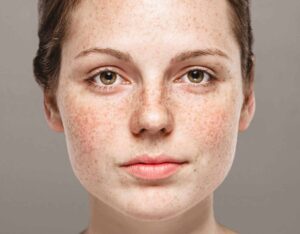
Brightening Skincare Ingredients And Products For Hyperpigmentation
Do you have uneven patches or areas of your skin that are darker than the rest? Or do you have dark spots on your skin? Or do you just have overall dull skin and would very much like a brighter complexion? Then this article is for you.
To brighten your skin and fight hyperpigmentation, choose products that are formulated with ingredients that block pigment production, namely antioxidants such as vitamin c, and topicals like retinoids and hydroquinone. Niacinamide, arbutin and mandelic acid, among several other ingredients are helpful in brightening an uneven skin tone.
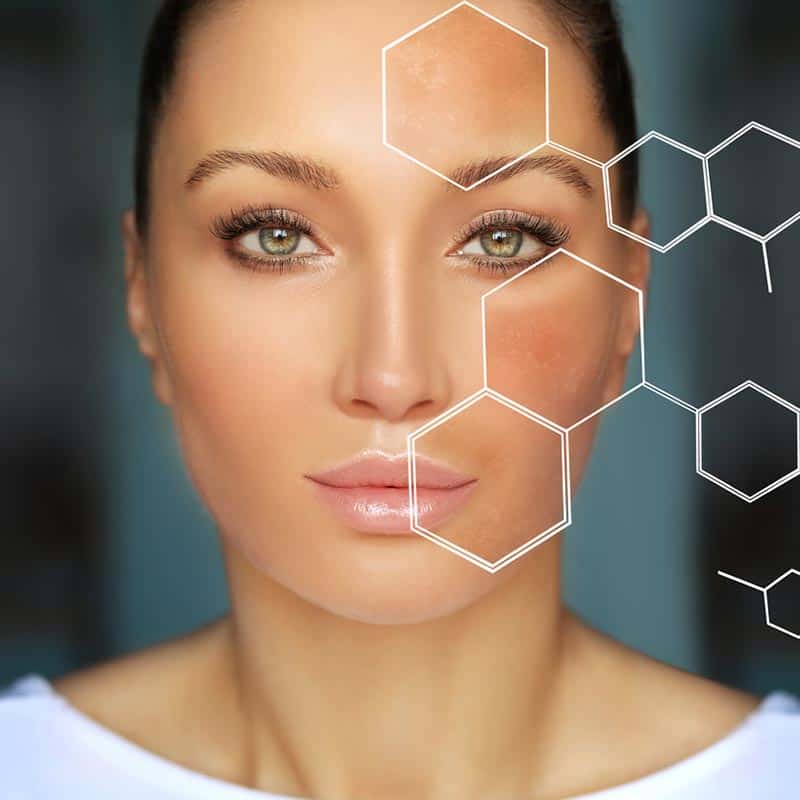
What Is Hyperpigmentation?
Hyperpigmentation is a condition in which patches or areas of the skin become darker in color in comparison to the rest of the skin. Melanin, which is a natural brown pigment in our skin that produces our normal skin color, is responsible for this when produced in excess. Hyperpigmentation is usually a harmless condition that can affect the skin color of people belonging to any race. It’s also important to note that while hyperpigmentation is not harmful, it is sometimes possible that it may be a symptom of another, underlying medical condition.
Types of Hyperpigmentation & Causes
While some types of hyperpigmentation is caused as a result of skin inflammations, acne, injury and other damages to the skin, some types of hyperpigmentation are caused by sun exposure. The most common types of hyperpigmentation are melasma, sunspots and post-inflammatory hyperpigmentation.
- Melasma: It is believed that Melasma is caused by hormonal imbalances and may develop during pregnancy. It is also known as chloasma or “the mask of pregnancy” when it’s observed in pregnant women. Women who consume birth control pills may also experience melasma. This does not mean that men cannot get melasma.
- Liver Spots: Despite the name, this has nothing to do with your liver. Liver spots are also known as “age spots” and are referred to as “solar lentigines” by doctors. They occur due to sun damage and are therefore usually found in areas that are frequently exposed to the sun. They are observed as flat, dark spots on these areas of your body.
- Post-inflammatory Hyperpigmentation (PiH): This is a temporary pigmentation of the skin following an inflammatory wound. Post-inflammatory Hyperpigmentation affects both genders equally and is more common in darker-skinned individuals. PiH usually looks like a discolored flat area of the skin. Inflammations caused to the skin such as an injury or a rash triggers melanocytes (cells that produce melanin) to release pigment granules (melanosomes) in excess. These granules cause the darkening of the area that has been formerly wounded and remains there long after the wound has recovered. Scratching your pimples can worsen this. Although the sun does not cause this type of hyperpigmentation, it can definitely aggravate the symptoms.

Skincare Ingredients For Hyperpigmentation
We’ll admit, choosing skin care is often tricky with endless amounts of formulations in the market and so many claims from each product. To make things easier for you, we’ve put together a list of five ingredients that can help you battle hyperpigmentation, while also being fully aware of which of these ingredients work best on which skin types. Are you ready? Let’s dive in.
- Vitamin C (Ascorbic Acid / L-Ascorbic Acid)
Number 1 on our list is, you guessed it, the very beloved skincare ingredient (and something we turn to when we get colds); Vitamin C. If you have ever looked or researched for a way to brighten any area of your skin, we’re sure that not coming by Vitamin C is quite rare. It’s one of the most talked about skincare ingredients for hyperpigmentation, blemishes, dark spots, dull skin, tanned skin, you name it. Vitamin C is the holy grail of anything and everything to do with skin brightening. Vitamin C which is sometimes referred to as “ascorbic acid” and “L-ascorbic acid” is an antioxidant that fights free radicals. “What are free radicals” you ask? They’re harmful molecules just like the sun’s ultraviolet rays that damage the skin and cause hyperpigmentation. Vitamin C combats hyperpigmentation in more ways than one. Not only do they neutralize these free radicals to prevent further damage to your skin, but it also decreases the production of melanin in your skin. This lightens discoloration and therefore makes your skin more even and brighter, while also stopping more dark spots or patches from appearing. Amazing stuff, right?
Skin Types: Suitable for all skin types.

- Mandelic Acid
Mandelic acid is a type of alpha-hydroxy acid (AHA) – a group of acids that are quite often used in skincare products that target aging skin and acne. All these names may scare you, but mandelic acid is actually made from almonds and can also be used to treat inflammatory acne as well. Mandelic acid also offers exfoliating benefits as it works to break down the connections between dead skin cells with its acidic nature. Mandelic acid also helps with skin cell turnover which can help a brighter and more even skin tone to come through. Mandelic acid is very effective on darker skin tones and those with melasma.
Skin Types: Suitable for sensitive skin.

- Retinol
Retinol is a form of Vitamin A and a beloved ingredient among skincare enthusiasts as it increases skin cell turnover and stimulates collagen production. By increasing skin cell turnover, newer healthier skin cells come to the surface, armed with more collagen and elastin. Retinol also exfoliates older and darker skin cells, unclogs pores to clear your skin and prevent acne breakouts. Less acne also means less scars left behind by acne. Retinoids can also help you achieve the best results from other products you apply by amplifying their effects.
Skin Types and Caution: Overall, individuals with any skin type can benefit from retinol, however those with sensitive, sun-damaged and over-exfoliated skin should practice caution when introducing active ingredients to their routine. Women who are breastfeeding or pregnant should avoid using Vitamin A derivatives such as retinol as they have been linked to severe birth defects. They can be listed under several names, which include retinoic acid, tretinoin, retinaldehyde and palmitate.

- Niacinamide (Nicotinamide)
Niacinamide (also known as Nicotinamide) is a type of Vitamin B-3. Niacinamide can help you fight against wrinkles and hyperpigmentation. However it may not be able to combat hyperpigmentation on its own. It’s best to look for this ingredient in skincare when it is combined with other ingredients. Research also shows that niacinamide concentrations of 5% can aid in lightening dark spots after 4 weeks of usage. Niacinamide also helps your skin retain moisture by aiding your skin to grow a lipid barrier. This is helpful for individuals of all skin types, especially those with eczema-prone skin.
Skin Types: Suitable for all skin types.
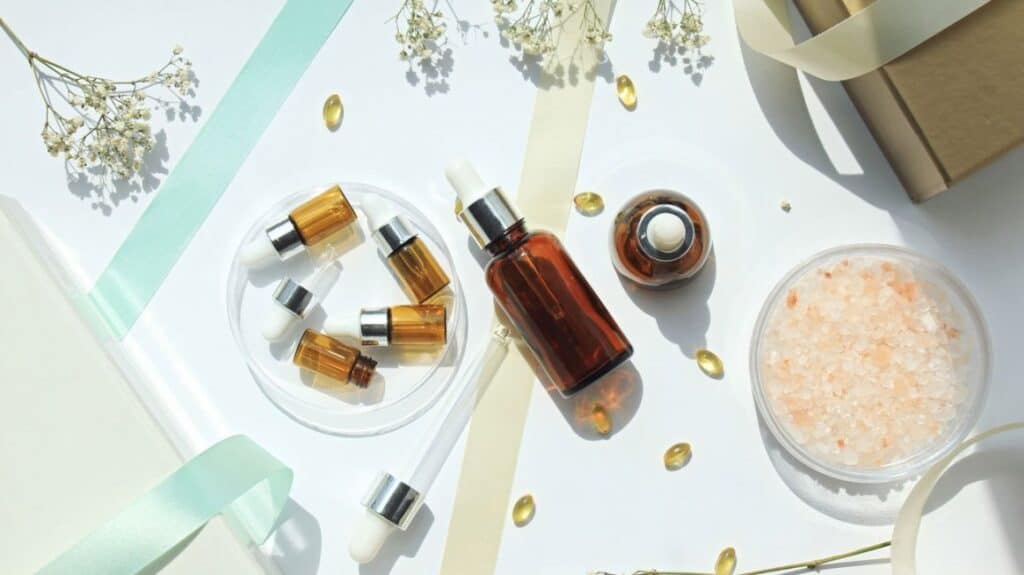
- Hydroquinone
Before we proceed with telling you what hydroquinone is and what it does, we must caution you to consult a dermatologist before you try this ingredient if you have a medium-to-dark skin tone, as this may make your hyperpigmentation worse. We wouldn’t want that now, would we?
Hydroquinone is a skin-lightening agent that works to remove dark spots, melasma, freckles and acne scars by bleaching the skin and decreasing the release of melanin. It does this by blocking tyrosinase which makes dark pigments less visible.
Skin Types: As mentioned earlier, hydroquinone works best on fair complexions. If you have a medium or a dark skin tone you must consult with a dermatologist before use of hydroquinone as it may worsen the condition. For individuals with sensitive and dry skin, hydroquinone may cause further sensitivity, irritation and dryness. Normal skin types and oily skin types are less likely to experience such effects.
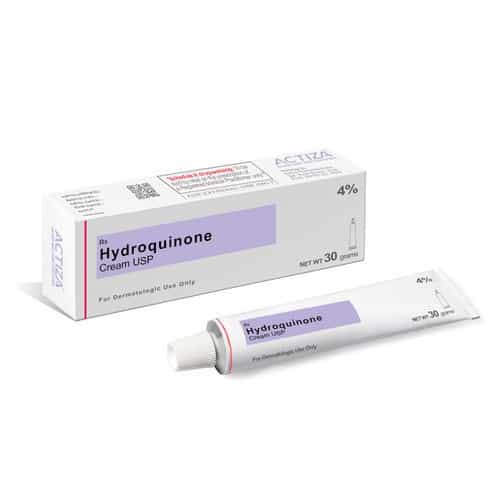
How To Prevent Hyperpigmentation
Prevention is always better than cure. However, before we dive into preventative measures, it’s important to note that not all causes of hyperpigmentation can be prevented, such as hormonal imbalances associated with pregnancy and birth-control pills. You can however prevent certain other instances of hyperpigmentation.
- Avoid sun exposure during peak hours.
Try to stay out of direct sunlight during the most peak hours which is typically from 10:00 AM to 04:00 PM to minimize sun exposure. You can also wear protective clothing and hats to minimize the exposure.
- Always use sunscreen.
Sunspots, freckles and other areas of existing pigmentation are created and worsened by the sun’s ultraviolet light. There’s no such thing as a “healthy tan” or a “safe tan” as any change in skin color is an indication of skin damage. To avoid this, always use sunscreen.
- Avoid irritation or inflammation.
If you’re having an acne breakout or experiencing skin sensitivity, it’s important that you follow the right skincare regimen to treat these issues and avoid scratching your skin or picking your pimples. Aggravating these issues will lead to post-inflammatory hyperpigmentation. Avoid touching your skin and when you do touch your skin for your skincare regimen, always wash your hands first.

Recommended Skincare Products To Treat And Prevent Hyperpigmentation
We’ve compiled a short list of Korean skincare products available at our store that may help you prevent and treat hyperpigmentation.
Exfoliating your skin may not provide you instant results in fighting hyperpigmentation, but it will help you slough away dead skin cells which can aid your skin cell turnover cycle. This is important to visibly diminish hyperpigmentation. However, it is also important to keep in mind not to over-exfoliate your skin which can make it more sensitive. Twice a week should do the trick.

This is a vitamin rich toner formulated with red energy complex and Vitamin C (one of the best ingredients to fight hyperpigmentation) to revitalize your skin for a brighter complexion while also keeping it more smooth and supple. This toner is also enriched with niacinamide (another great ingredient we discussed earlier) and pomegranate extract to help brighten uneven skin tone and fade hyperpigmentation. The slightly-acidic formula is free from alcohol and fragrance and is suitable for all skin types including sensitive skin types. Vitamin B12, hibiscus and pomegranate extract help keep your skin hydrated and healthy by soothing and moisturizing the skin. This toner with its amazing ingredients helps in antioxidant activity.

This toner is infused with AHA to slough off dead skin cells, BHA to remove excess sebum that may clog pores, PHA to combat moisture loss and tea tree oil to combat acne. It is also infused with niacinamide (the ingredient we discussed earlier) which will help you to combat hyperpigmentation and overall dull-looking skin.
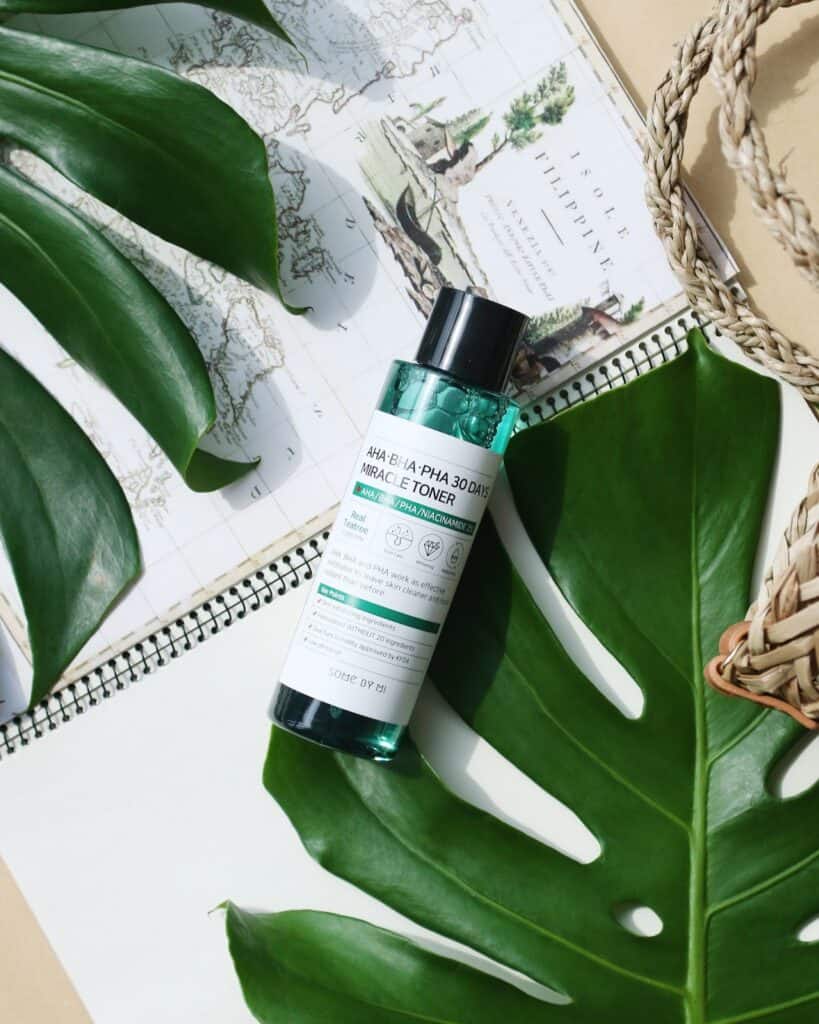
This serum is formulated with 20% pure Vitamin C which helps in reducing blemishes, hyper-pigmentation and signs of aging. Too much Vitamin C can irritate the skin, so 20% is a good concentration. If you have sensitive skin you can start with a product that has a lower concentration of Vitamin C and work your way up to this product. This serum is also enriched with Vitamin B12 to soothe skin, plus glutathione and niacinamide to brighten your complexion. If you are using this product during the day time, do make sure to wear sunscreen and to not mix this product with other products containing high levels of AHA, BHA or retinol. Too much acidity can irritate your skin.

Did you know that the newest data shows that UV damage continues to damage your skin even hours after you’ve left the sun? Wearing an antioxidant like Vitamin C at night can not only help you fight the damage caused to your skin throughout your day, but can also help your skin to fight sun damage the next day too. In an article published by allure.com Joshua Zeichner (the director of cosmetic and clinical research at Mount Sinai Hospital in New York City) says, “your body builds up a storage of antioxidants as you use them. So using vitamin C serum at night will help guarantee your body has enough ready to go in the morning when you need them most.” Which is why we are happy to suggest you this Korean sleeping mask that can help you do just that.
This multi-functional sleeping mask formulated with yuja extract helps you achieve a radiant and youthful complexion while you sleep! How amazing is that? It also contains glutathione and niacinamide for brightening, aquaxyl and fructan for moisturizing, as well as ten kinds of vitamins for revitalizing benefits. This innovative sleeping mask is perfect for those with dry skin, dull skin, uneven skin tone or eye bags. The quick-absorbing formula boasts a light and refreshing texture plus relaxing citrus scent for a good night’s sleep. All you have to do is apply this mask as the last step of your night-time skincare routine and wake up to your skin that’s armed with Vitamin C to fight UV damage the next day.

This trial kit guarantees you results in just 30 days! It’s a great way to feel out the products in the brand’s Yuja Niacin brightening line and yes, that means you get to try a mini version of the sleeping mask too, along with a toner, serum and a gel cream, all formulated with some amazing ingredients! The toner contains 90% Yuja extract to moisturize skin, while twelve kinds of vitamins combined with lotus flower extract work to soothe irritated patches. The serum is infused with 82% yuja extract, which absorbs quickly into skin to leave it fully hydrated and glowing. On the other hand, the gel cream contains 90% yuja extract for moisture, ten kinds of vitamins to revitalize tired skin, and glacial water to produce an instant cooling effect. The sleeping mask (as we’ve described above) hydrates and nourishes skin with a potent cocktail of 70% yuja extract, aquaxyl, Fructan™ as well as ten kinds of vitamins. To use this kit, start with the toner on a freshly-cleansed face before proceeding with the serum. Seal in the goodness with the gel cream and finish with the sleeping mask.
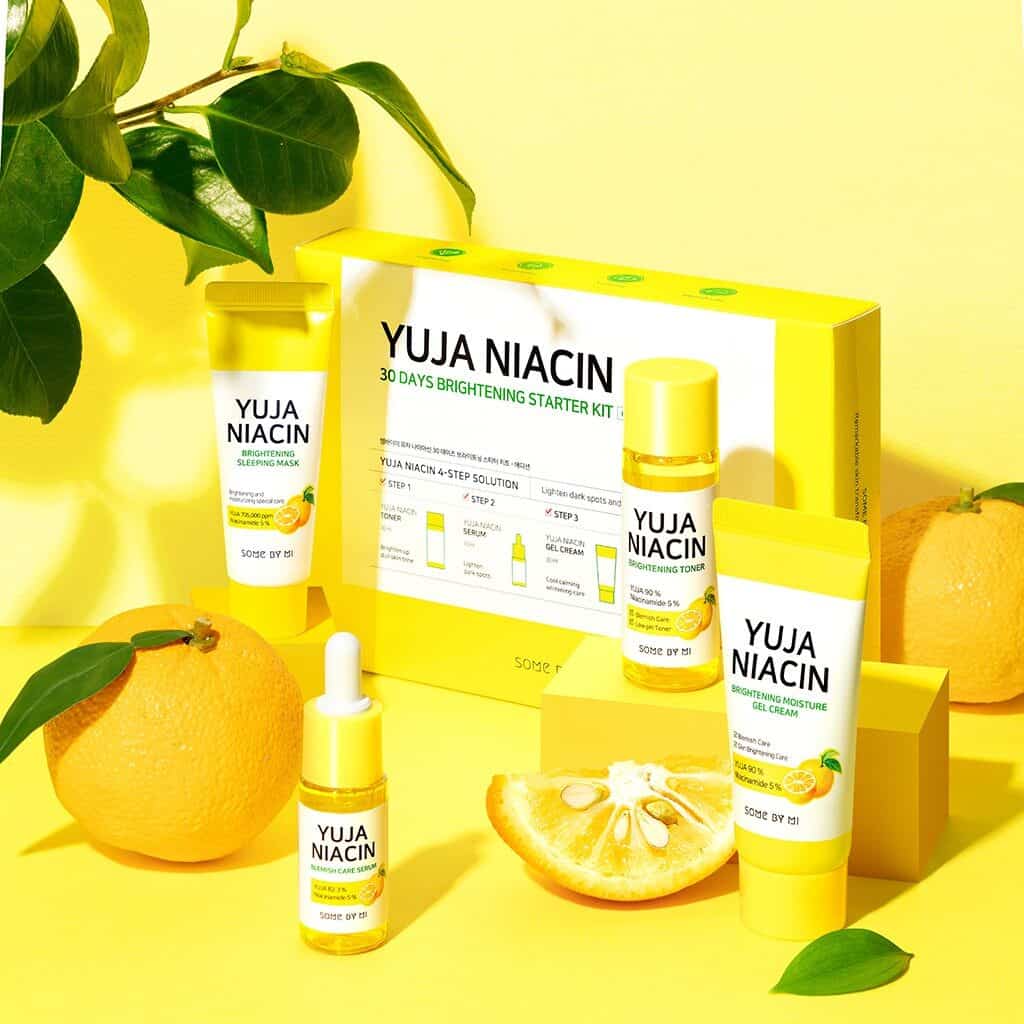
Sun exposure is responsible for the most cases of hyperpigmentation as sunlight triggers the production of melanin. Sunlight can also make existing dark spots, melasma and other forms of hyperpigmentation worse by darkening these areas. For a numerous different reasons, most of it more serious than just hyperpigmentation, you must never skip applying sunscreen every two hours you are exposed to the sun. Try this sun gel which is strengthened with a protection level of SPF50+ and PA++++ that blocks both UVA and UVB rays. This soothing sun gel comes in a lightweight and non-sticky gel formulation that feels incredibly refreshing on the skin. It is formulated with ice plant, glacial water, antozone-rose and thanaka extracts to refresh, moisturize and reduce blemishes on skin. The sun gel also has a water-and-sweat-resistant formulation and super wearable everyday.
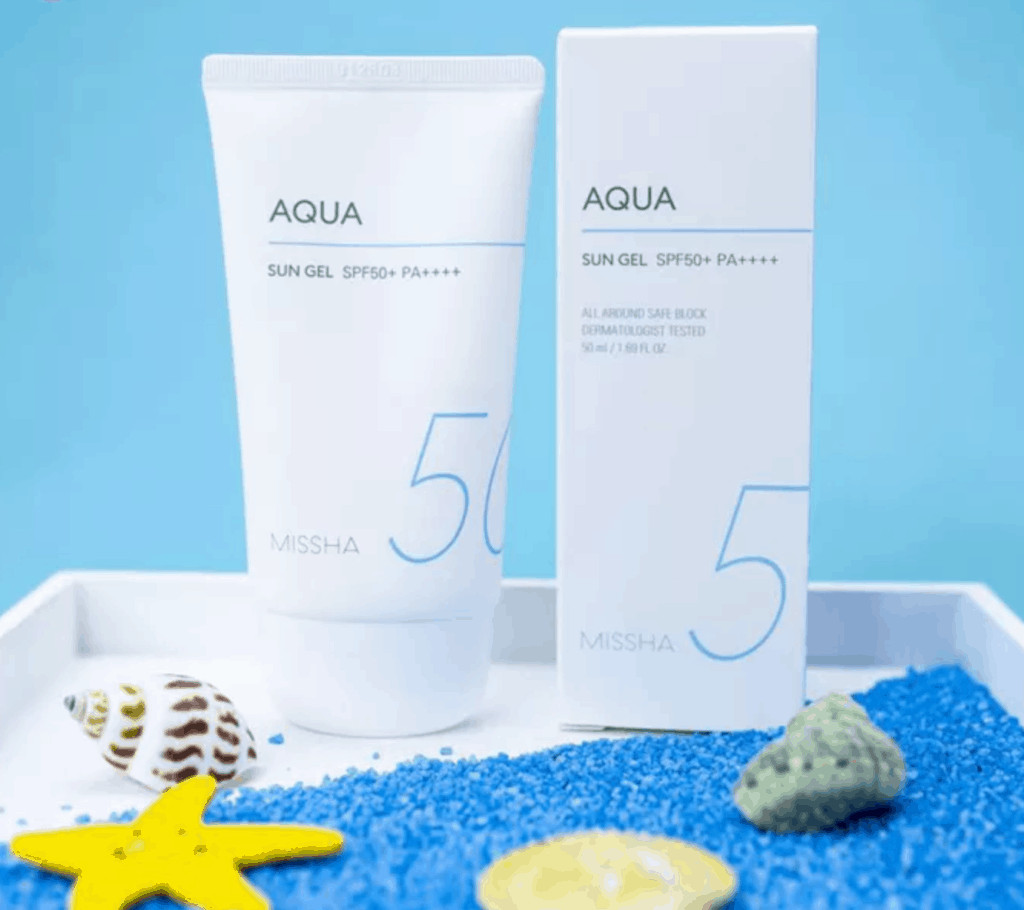
Share:
Categories
Latest Post

Benefits of Aloe Vera for Skin, Hair and Body

A Makeup Artist’s Guide To Perfect Pre-Makeup Skin
